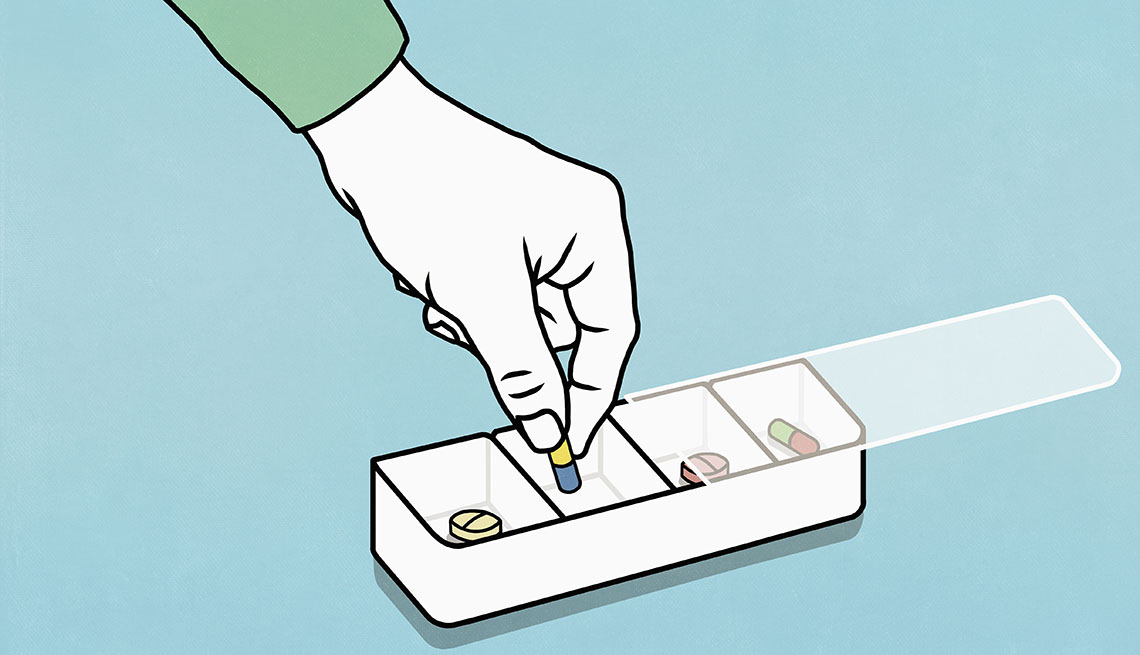
- Select a language for the TTS:
- UK English Female
- UK English Male
- US English Female
- US English Male
- Australian Female
- Australian Male
- Language selected: (auto detect) - EN
Play all audios:
6. ANTIHISTAMINES It’s easy to assume that over-the-counter meds don’t carry serious side effects because they’re so readily available. But just because something is available without a
prescription doesn’t mean it’s risk-free. Research suggests that taking an antihistamine on a regular basis — to treat allergies, for instance — can result in weight gain. ANTIHISTAMINES
THAT MAY CAUSE WEIGHT GAIN INCLUDE: * Cyproheptadine (Periactin) * Cetirizine (Zyrtec) * Fexofenadine (Allegra) * Desloratadine (Clarinex) “The major study which demonstrates the
relationship between antihistamines and weight gain comes from the journal _Obesity_,” Umashanker says. “It revealed that men who used antihistamines had an average weight of 214 pounds
versus 192 for those not on antihistamines, and women had an average weight of 176 pounds on antihistamines versus 166 pounds for those not on antihistamine.” Why? Histamine, a chemical in
the body known to be a key player in allergic responses, decreases hunger by affecting the appetite control center in the brain, so it makes sense that an antihistamine would have the
opposite effect, interfering with the “I’m full” signal coming from the rest of the body, according to the Obesity Medicine Association. 7. ANTI-EPILEPSY DRUGS A review of research
published in _Epilepsia_ suggests that people with epilepsy — a brain disorder that causes seizures — exercised less and tended to be obese even if their seizures were under control.
Conventional wisdom suggests that a fear of doing anything that could provoke a seizure would figure into why people with epilepsy are less inclined to be physically active. But
anti-epilepsy drugs have been shown to play a significant rolein weight gain: * Valproic acid (Depakene) * Gabapentin (Neurontin) * Pregabalin (Lyrica) * Possibly carbamazepine (Carbatrol)
WHAT TO DO: If you’re taking any of these and experiencing weight gain, talk to your doctor about possible alternatives such as topiramate (Topamax) or zonisamide (Zonegran), both of which
are also prescribed for migraines and associated with weight loss. 8. ANTIPSYCHOTICS People with mental health disorders are two to three times more likely to have obesity (meaning a body
mass index, or BMI, of 30 or more) than the general population. A review of research examining antipsychotic medicine explains why: Most of those drugs cause weight gain. Over the course of
treatment, around 7 in 10 patients will gain weight — rapidly in the initial period after starting these meds, but it continues over the long term. The risk appears to be highest with: *
Olanzapine (Zyprexa) * Clozapine (Clozaril) Making matters worse, these types of drugs impair glucose function and increase cholesterol and triglycerides, putting patients more at risk for
developing metabolic syndrome, according to a review of research in _Neuropsychiatric Disease and Treatment_. WHAT TO DO: If you’re taking an antipsychotic for bipolar disorder,
schizophrenia or depression and you’re experiencing weight gain, talk to your doctor about newer medications on the market. “They tend to have lower risk of weight gain,” Batsis says. Keep
in mind that everybody is different, he hastens to add. “While we can generalize, these medications may affect different individuals in different ways.” WHY DO SOME MEDICATIONS CAUSE WEIGHT
GAIN? The source of what causes weight gain varies between medications. Some may increase your appetite, tempting you to eat more, resulting in a few pounds creeping on. Others might slow
your metabolism down so calories aren’t burned as quickly. Certain classes of drugs may make your body retain water. Although this wouldn’t mean you’ve put on extra fat, it will make you
weigh more when you hit the scale. In other instances, the way your body stores and absorbs sugar and other nutrients may be affected, according to the University of Rochester. Research
suggests a growing number of people take drugs that cause weight gain — most notably, for conditions that are exacerbated by excess weight, including heart disease and type 2 diabetes.
Drawing on data from the 2017-2018 National Health and Nutrition Examination Survey (NHANES), a study published in _Obesity_ found that 1 in 5 U.S. adults take at least one medication that
causes weight gain, the most common being some beta-blockers and diabetes drugs such as insulin and sulfonylureas. Another drawback: Weight gain as a side effect can make people less likely
to stick to their prescribed medication, says Devika Umashanker, M.D., system medical director with Hartford HealthCare’s Medical and Surgical Weight Loss Program and an obesity medicine
specialist. ALWAYS CONSULT YOUR DOCTOR BEFORE MAKING ANY CHANGES TO YOUR MEDICATION, INCLUDING STOPPING OR SWITCHING. WHAT TO DO IF MEDICATIONS CAUSE WEIGHT GAIN If switching meds isn’t an
option, that doesn’t mean you’re powerless over the extra pounds. Consider meeting with a registered dietitian who can help you learn how to make healthier food choices. Getting more
exercise can also help treat weight gain, especially a combination of cardio (such as brisk walking) and strength training. “Countering medication-induced weight loss is difficult,” Batsis
says. “Trying to engage individuals in health promotion efforts is key.” Although it may be tempting to turn to an anti-obesity drug to lose the unwanted pounds, Batsis recommends against
doing so. “Treating side effects of one medication with another can be problematic and lead to what we term polypharmacy,” he says. “That, in and of itself, can lead to adverse events.”



